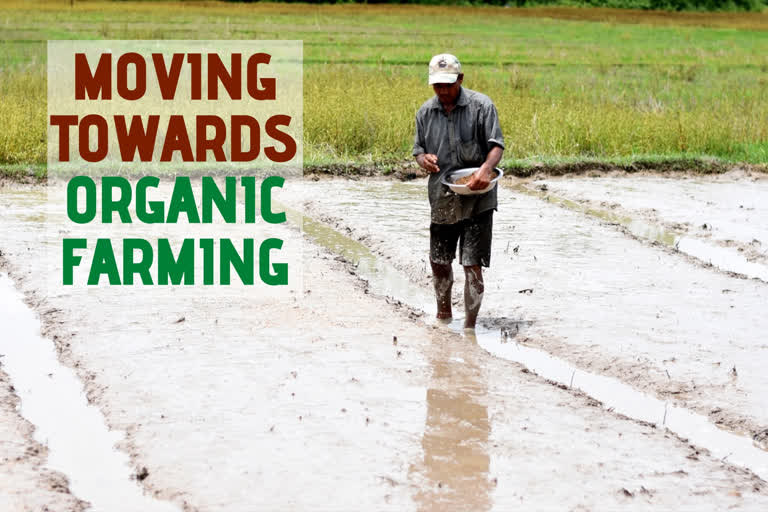New Delhi: The Union budget 2020 on agriculture sends one very clear message - that the Modi government is committed to sustainable agriculture (organic and javik kheti). Finance minister Nirmala Sitaraman through poetry spelled out a plan to increase area under organic farming to 4 lakh hectares by 2020-21.
Under the Green revolution budget, Paramparagat Krishi Vikas Yojana (CSS) has been allotted 500 crore for increased coverage of area under organic certification and additionally have 0.51 lakh Ha area brought under organic certification. This would increase production of more organic food for local consumption and exports. APEDA approximated Indian organic exports at Rs 5,151 crore in 2018-19, a 49% jump from 2017-19.
Other commendable steps announced by the finance minister to ensure agro-ecological practices return to Indian farms were the creation of an online portal on "jaivik kheti" to bolster the organic market, and the Village storage scheme to empower 'Dhaanya Lakshmi' and all these steps are consistent with Piyush Goyal's budget speech of 2019 which made organic food production as the 8th dimension of Modi government's vision for 2030. The current budget is also in-line with the BJP's manifesto promise and comes as a relief to millions of sententious environmentally conscious consumers and swadeshi supporters alike.
Read: Ministries sign pact to promote organic farming, healthy eating
But meanwhile, APEDA projects the increase of organic export to reach USD 50 Billion by 2025, many veterans of the organic and seed sector wonder, who will seed organic India? Do we even have enough certified organic seed? Exports of this magnitude can't rely on land races or traditional varieties of seeds alone. We need more efficient mechanisms of breeding organic seeds to support this growth. Indian farmers need superior quality even in organic seeds to sustain this boom.
Untreated not Organic
While most people in India confuse untreated seeds (seed pre-soaked in fungicide or chemicals) as organic but they are misinformed. A seed can only be called organic if it is grown in organic soils with agro-ecological practices and an organic certificate. And truth be told, the options of buying high performing organic seeds are very limited as the organic seed industry is still very primitive when compared to the competitive and R&D based organic seed industry of USA or Germany.
Read: Indian Seed Congress 2020: Stakeholders gather in the National Capital
With the emergence of the greater demand for organic food, regulations and standards will only become stricter. Consensus between all organic certification mechanisms is: all seed used to grow organic foods needs to be certified too. Current level of technology enables organic certifying agencies to trace residues in the seed. And further this may be a critical point in the future of the organic trade, especially to EU and the US.
Seed Organic India
As per reports, the global organic seed market will be 5.4 Billion (USD) by 2024. Hence, India needs to swerve towards not just more organic food yields, but also to become an organic seed production hub. The government and plant breeders should create a policy for organic seed production in consultation with global certifying agencies and etc. This may be followed by a push to create organic seed production clusters in Sikkim, Uttarakhand, Himachal and the North Eastern states. Sikkim, an organic state, can be most suitable for this endeavour. The Union Budget needs to have a special concession for tax break and easier land leasing terms in organic zones to have a discernible effect on the incomes of farmers and plant breeders.
India, especially in the biodiversity rich zones, is a treasure trove for seed production. By harmoniously working with nature, farmers can produce greater yields and resistances in their seeds, while also conserving water and their habitats. National Bureau of Plant Genetic Resources (NBPGR) through a novel program, and perhaps some funding from government, can encourage organic seed entrepreneurs in these zones. Other organisations such as Biodiversity International, ICAR and state agricultural universities can strengthen this drive. New modules need to be created for advanced levels of evolutionary participatory breeding (EPB) that are available to plant breeders and farmers in regional languages. This program should be implemented with assistance of the government; FPOs can play an important role too.
To sum up, Modi government must prepare to remove any impediments to make India the largest exporter of organic food. Organic seeds are not only vital for this vision, but if pursued with determination may fulfil the government’s aim of increasing seed exports to 10% and enrich Indian farmers four times over. The question only remain, will India make hay when the sun shines on Indian organic produce or nip the budding organic seed sector.
Read: Very happy Budget has detailed plan for Agriculture: Dr M S Swaminathan



